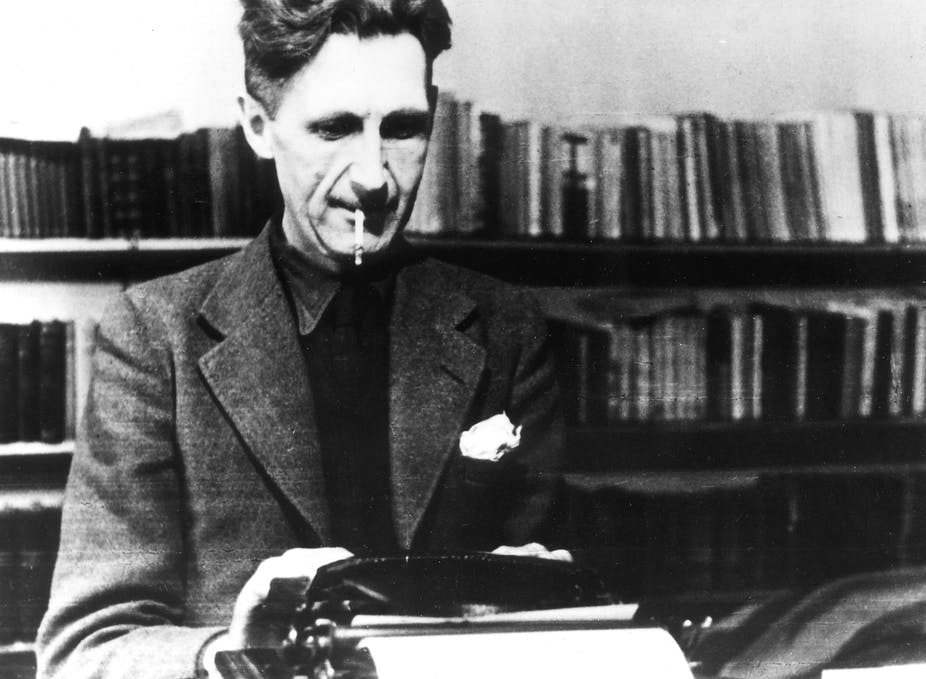By Lara Sahagun
George Orwell, born Eric Blair, was an essayist — yet he was best known for two of his books, 1984, and Animal Farm, both criticizing mankind for its flaws (most commonly, greed, the ability to be corrupted, and our insatiable thirst for power). Interesting debates float around those novels: Was Winston Smith (1984) crazy? Do the pigs (Animal Farm) accurately represent humankind, if they do at all? And so forth. However, one question has yet to be debated — why did Orwell write these books? As our present nears closer to the somber future Orwell had predicted in 1984, the question becomes more and more imminent — and seemingly grows more and more unanswerable.
A Brief Reconstitution of 1984
1984 is a dystopian novel of about 250 pages, depending on the book model, complete with an 8-page-long (front and back!) appendix explaining the linguistics used in the novel, such as doublethink and miniluv (it’s not as cute as you’d think). The novel is set in the year 1984 (hence the name), and in it, Winston Smith, our main character, is trapped under the totalitarian control of the Party — a government with ears everywhere, which rules under the watchful eye of Big Brother, an unknown power controlling it all. Winston realizes just how little privacy he has, to the point that only his thoughts are safe from the prying eyes of Big Brother. He meets someone — Julia — who feels the same way about the government, and together they attempt to conspire against it in what they deem to be the most private areas possible. | Spoiler Alert Ahead | Winston and Julia pass a blessed amount of time in a little-known shop-turned-sanctuary, where they feel truly alone. They realize that they’re two against an infinite amount of men, power, and arms. They’re hopeless — and they know that their moment above the clouds will end. After all, if you’re rising, there’s a moment when you inevitably fall, a moment you dread but accept, predominantly because you know you can’t do anything about it. “We are the dead,” Winston and Julia softly repeat. And they are the dead, for they’re caught by the Thought Police (the police that catches those with thoughts remotely against the government), and tortured until finally Winston is executed. Having gone through days’ worth of torture, mind games, and twisted fear-guided experiments, Winston suddenly feels tired. He’s been fighting an inner battle against Big Brother his whole life — a battle he was never able to bring over the outskirts of his mind, for fear of being caught. The silence of his rebellion dies with the sounds it does not emit, with the allies he cannot find. It’s, as he knew before, hopeless. He is the dead. But — what has he been fighting for this whole time? Was it really Big Brother? Or was he, Winston Smith, wrong? Illusioned? The torture has freed him from his prison of self-created mirages, and now he can see clearly. It’s finally okay. He looks around and faces a gargantuan statue of Big Brother, and as the execution bullet enters his brain, Orwell writes what could very well be one of the most memorable last words of a book in all of literature history.
“Two gin-scented tears trickled down the sides of his nose. But it was all right, everything was all right, the struggle was finished. He had won the victory over himself. He loved Big Brother.
– Winston Smith, 1984
Quotes from 1984 are:
- “We shall meet in the place where there is no darkness” (O’Brien to Winston Smith)
- “It was a bright cold day in April, and the clocks were just striking 13” (first line in the book)
- “If there is any hope, it lies in the proles” (Winston Smith)
- “Love is war; Ignorance is strength; Freedom is slavery” (the Party’s motto, plastered everywhere)
- (the last line of the book, quoted above)
For more information on 1984, please see the bottom of this article.
A Brief Reconstitution of Animal Farm
Written from an outward perspective, Animal Farm covers the revolution of the animals against an abusive farm owner, and how a mission for freedom and justice for all was corrupted into a greedy plot to take the ex-farmer’s place. The characters include a horse named Boxer, a set of pigs (one named Napoleon, among others), a cranky donkey, another horse named Clover, and other farm animals. The pigs help establish control of the farm after the farmer was chased out, and write up a set of rules for everyone to follow in order to be equal; however, as they notice that they — the pigs — are the only literate animals on the farm, they slowly adjust the letters to their advantage. Suddenly, they’re allowed to wear clothes; they don’t have to work; and they collect most of the animals’ hard work for the day. Some animals are suspicious, but others are devoted to the pigs and follow them blindly, like Boxer. The animals know that something’s wrong, but desperate as they are to find out what it is, they can’t do anything about it, because they can’t read and consequently can’t determine what the rules say, and are helpless in every way. The pigs finish by inviting back the farmer and his friends, and they sit down to play cards — a very human game. The animals are all locked outside, and only the pigs stay inside the house and live in the warmth. The other animals look on sadly from the frost-bitten sheds in a star-less sky. The book closes with a flourish, with the farm animals watching the game unfolding from the lonely yard in which they had to work all day, and trying to differentiate the pigs from the men, to no avail: “The creatures outside looked from pig to man, and from man to pig, and from pig to man again; but already it was impossible to say which was which.” This last phrase confirms what the book had been leading up to; how the pigs’ corruption, hunger for power, and will to sacrifice others in the process, was no different than that of man; and how anything, no matter how pure the intention, can be corrupted with power and all that comes with it.
Both these stories were predictions about men and the future, and Orwell was usually one to write about the past (see The Orwell Reader: A Collection of Essays ). So why did he write about these topics? It’s not unlike an author to stray from their comfort genre, but they most commonly do so under a pseudonym. That being said, Orwell chose to write two books on topics contrasting those he wrote in his essays, without possible reason. He had hinted in A Hanging (one of his essays) of the wrongdoings of men, and how awry and immoral it felt to get rid of a human life, but that was all that he put forth on the subject. A possible explanation to 1984‘s creation was that he had briefly helped review a book by the name of Darkness At Noon, by Arthur Koestler, which has an eerily similar theme to 1984. It’s very possible that Orwell inspired himself from the book to write his version of it with the idea that he could significantly improve it. And that he did, for it — in our opinion — is one of the greatest novels of all time. Inspiration or not, the writing, plot, and execution of both 1984 and Animal Farm are so one-of-a-kind that they will leave an impression on you, to the extent that you’ll even start to doublethink yourself.
Citations:
- Orwell, George. 1984. Penguin, 1954.
- https://www.newstatesman.com/culture/2013/01/what-am-i-fighting-george-orwell-arthur-koestlers-darkness-noon
- https://www.britannica.com/biography/George-Orwell
- (Orwell’s collection of essays): https://www.amazon.com/Orwell-Reader-Fiction-Essays-Reportage/dp/0156701766
- More 1984 : https://thebostonhound.com/guest-essay-1984-rave/


